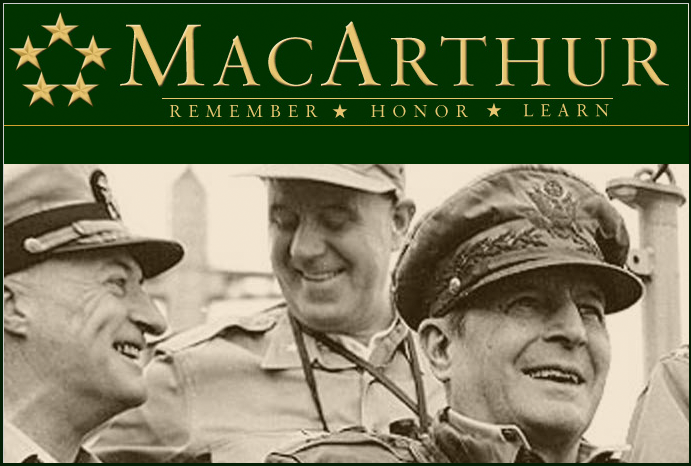
General Douglas MacArthur
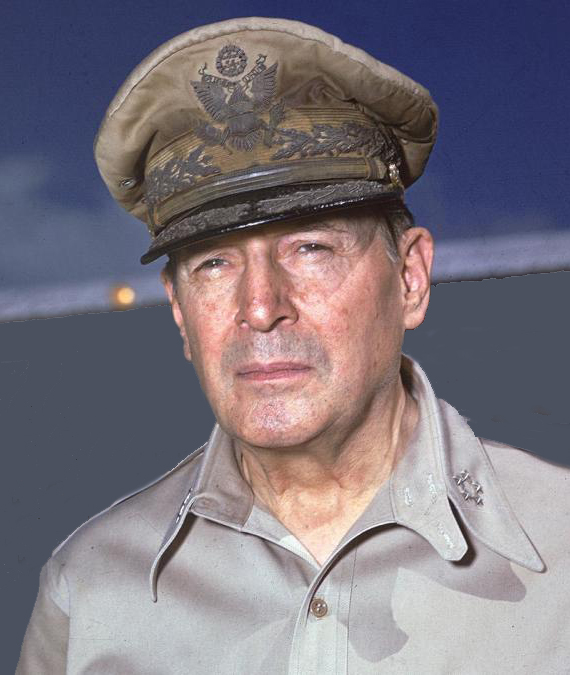
General Douglas MacArthur
In 1935, after a long military career, Douglas MacArthur reverted to the rank of Major General and served as Chief Military Advisor to the Commonwealth Government of the Philippines, helping prepare the islands for independence. He retired from the Army in 1937 and was included on the retired lists with the rank of full general (and the rank of Field Marshal in the Philippine Army).
In July 1941 MacArthur was recalled to the Army and appointed Commanding General of the United States Armed Forces in the Far East. Following the Japanese attack on Pearl Harbour in December, he was promoted to full general and ordered to defend the Philippine islands from invasion. However, with the military situation rapidly deteriorating, he was ordered to leave on 22 February 1942 delivering his famous parting message 'I shall return'. As Supreme Commander of the Allied Forces in the SouthWest Pacific Area he initially had his command base in Melbourne where he arrived on 21 March but his headquarters were relocated in Brisbane from 20 July. In 1944 he returned to the Philippines and in December was promoted to the rank of General of the Army: Manila was liberated on 5 February 1945. At one stage it was envisaged that Macarthur would lead a massive invasion of Japan, an outcome which did not eventuate with the Emperor's announcement of a Japanese surrender following the dropping of the atomic bombs on Hiroshima and Nagasaki. Instead it was MacArthur who formally received the Japanese surrender in September 1945.
Between 1946 and 1948 MacArthur, as Supreme Commander of the Allied powers, was responsible for overseeing the reconstruction of Japan, including creating the constitution promulgated in 1946. The new Japanese government took power in 1949. In the following year MacArthur was named Commander of all United Nations forces in Korea to lead the Allied counter offensive against North Korea. However in April 1951 he was recalled by President Truman after issuing a unilateral ultimatum to Mainland China. On 19 April in his farewell address to the US Congress, MacArthur concluded with reference to the old soldiers' barracks ballad, 'Old soldiers never die, they just fade away'.
Video
Douglas MacArthur - General of the US Army
U.S. Army video from the "The Big Picture" series – a biographical documentary of General Douglas MacArthur. While obviously biased in favor of this Army general, it is still worth watching for the historical content. [28:43]
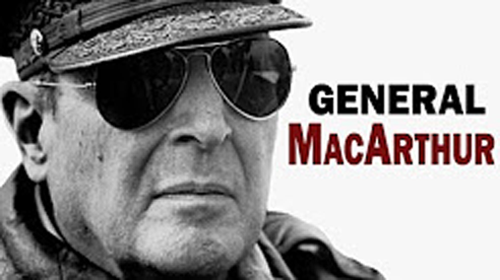
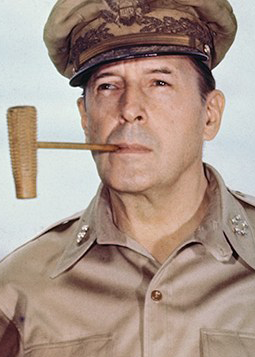
General Douglas MacArthur: A Man of the People?
Perhaps General Douglas MacArthur's greatest victory was not one of his many military successes. After the War, General MacArthur rebuilt Japan into a successful democracy. Perhaps that is his greatest legacy.
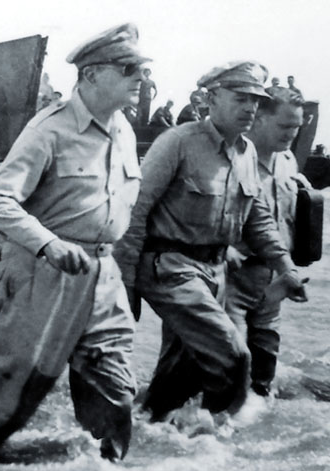
The Truth Behind the Famous MacArthur Photo
For more than 70 years, questions have swirled around the famous photos of General Douglas MacArthur’s beach landings—first on Leyte, then on Luzon—as American troops returned to liberate the Philippines. Stories persist that MacArthur, no stranger to controversy or drama, staged the photos by coming ashore several times until the cameraman got the perfect shot, or that the photos were posed days after the actual landings. Those who were present say neither of these oft-repeated stories is true. But what really happened is even stranger than these misguided rumors.
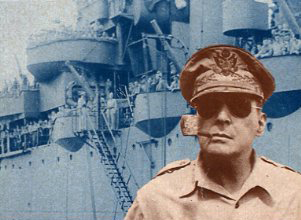
MacArthur's Navy
The Seventh Fleet essentially became "MacArthur's Navy" in the Battle for the Philippines.
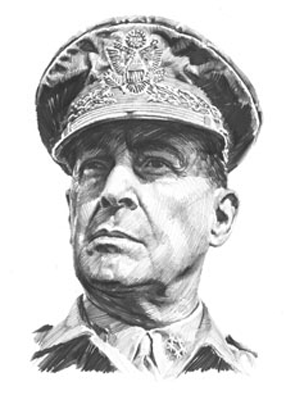
Douglas MacArthur: A Brief Biography
Noted for his bold tactical decisions, General Douglas MacArthur (1880-1964) is one of the most admired military officers in American history. While serving in France during World War I, he was promoted to brigadier general and earned decorations for heroism. In World War II, his careful coordination of land, sea, and air assaults minimized casualties and helped ensure the Allies' success in the Southwest Pacific. After the war, MacArthur administered Japan's transition to democracy.
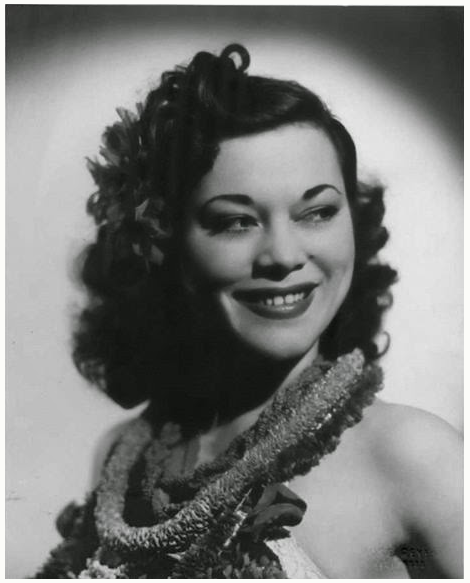
The Lovely Miss 'Dimples'
Elizabeth (born Isabel Rosario) Cooper was born to a Scottish father and Filipina-Chinese mother. She was nicknamed "Dimples". As a teenager she traveled Southeast Asia as a torch singer-entertainer. Isabel appeared in a few B-grade Filipino films starting in 1925, under the screen name "Chabing". Two of her films were Miracles of Love (1925) and Ang Tatlong Hambog (1926). In the latter film, Cooper made Philippine film history with Luis Tuason when they performed the very first kissing scene in a Philippine film. She was 12 years old at the time.
In 1930, at the age of 16, Cooper met the American General Douglas MacArthur, then commander of all U.S. troops in the Philippines. MacArthur's marriage had ended a year earlier. Cooper became his mistress in Manila, a fact the 50-year-old MacArthur hid from his 80-year-old mother.
Five months after they first met, MacArthur returned to the United States; while he intended to bring her to Washington, he could not risk scandal by traveling with her, so he bought her a ticket on a ship to arrive after him. She arrived in Washington and ended up ensconced in an apartment in Georgetown, Washington, D.C. MacArthur later moved her to the Chastleton Hotel. According to biographer William Manchester, MacArthur "showered [Cooper] with presents and bought her many lacy tea gowns, but no raincoat. She didn't need one, he told her; her duty lay in bed."
In 1933, when the secret affair threatened to become public, MacArthur brought it to an end, reportedly giving her $15,000 and a ticket back to the Philippines. She did not use the ticket and never returned to the Philippines. In 1934, the 20-year-old Cooper moved to the Midwestern United States, where she owned a hairdressing salon, before moving to Los Angeles several years later.
Cooper tried to find work as an actress in Hollywood; however, the only roles that she could manage were those as an extra, such as a geisha and a Filipina nurse in films such as The King and I and Squaw.
Disappointed by how her life and career turned out, the middle-aged Dimples Cooper committed suicide with an overdose of barbiturates in 1960 while in Los Angeles. She was 46 years old.


